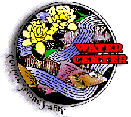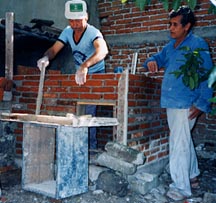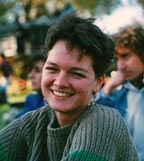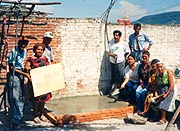
National Water Center, Eureka Springs, Arkansas

National Water Center, Eureka Springs, AR
Updated: April 2014 Contact: Contact: NWC
Contents ©1999-2014 by National Water Center. All rights reserved worldwide.
Cuernavaca "City of Eternal Spring" . . . and Sewage
by George Anna Clark
Cuernavaca sits in the foothills of the Chichinautizin Moutain Range, which runs west and east and separates Cuernavaca from Mexico City on the north. Springs, wells and irrigation canals are heavily contaminated with fecal material, resulting in water-borne epidemics such as cholera.
Empowerment
Empowerment is the foundation of our work, Espacio de Salud, A. C. (ESCA) focuses its endeavors on the end result of powerlessness. Low-income communities have very little control over their daily lives. Low-income persons often don’t expect to have any power over their lives. Therefore, when we work with communities, our greatest priority is in empowerment: We don’t try to convince them that “our” dry toilet is the best, we offer tools so that they realize that they have the ability to analyze and choose (or discover themselves!) whichever solution is needed for their community.
George Anna Clark is the coordinator of Espacio de Salud's environmental program. She is originally from Arkansas and has lived in Cuernavaca, Mexico since 1987.
This sounds very lofty and idealistic, but has its practical side as well... What is the point of wasting our time and resources in training people to build and use dry latrines if a month later the government can convince them to hook up to the sewage system?
Dry Toilets
The good news is that environmental awareness is increasing! ESAC is presently in great demand by low-income grassroots community groups for our services in environmental education and consultation regarding appropriate technologies.
Although our educational programs include a variety of issues as well as technological options, our assistance is most often requested regarding alternatives to conventional sanitation. The most popular alternative we’ve worked with is the modified Vietnamese double vault latrine. (The modification consist of adding toilet seats to the original seatless design.)
This dry toilet is simple to build using local materials. Similar to a composting toilet, it is easier to maintain and cheaper to build. Because the specially designed toilet separates the urine from the feces, the urine can be easily captured and used as fertilizer or fungicide.
The toilet seats are easily fabricated from used objects such as buckets and funnels cut out of plastic bottles. However, they are also produced by local, independent “micro-businesses’ in southern and central Mexico in a variety of colors and materials. Production has just begun using recycled plastic!!!
For more information regarding ESAC’s work in environment and health issues in the states of Morelos, Mexico, Guerrero, and Oaxaca please write to the following address: ESPACIO DE SALUD, A.C.,Apartado Postal 1-1576,Cuernavaca, Morelos 62001,52(73)18-07-20 (telephone and fax), email: <esac@laneta.apc.org>.

The bricklayer volunteers his time to build dry toilets for his friends and neighbors. They assist by mixing the cement and providing the beer!
Bad As Well As Good News
Mexico has suffered in the last 25 years an ever worsening spiral of environmental, economic and political crises which seem to deepen at every turn. On the other hand, ESAC’s staff is blessed to be working with many groups of low-income, marginalized women (as well as a few men) who are deeply committed to protect the environment and the health and well-being of their communities.


This popular grassroots groups "Ixtelloati" gets together on Sundays to help each other build dry toilets in their homes. They also use them as demonstration models for their neighbors.7
